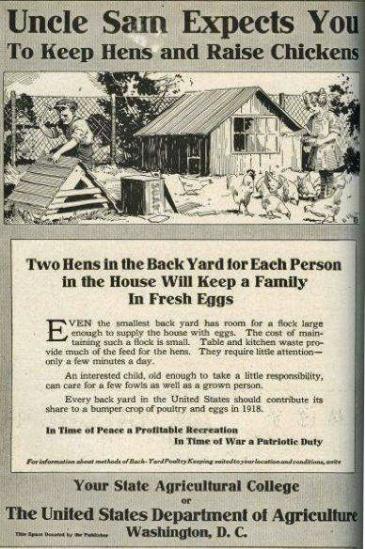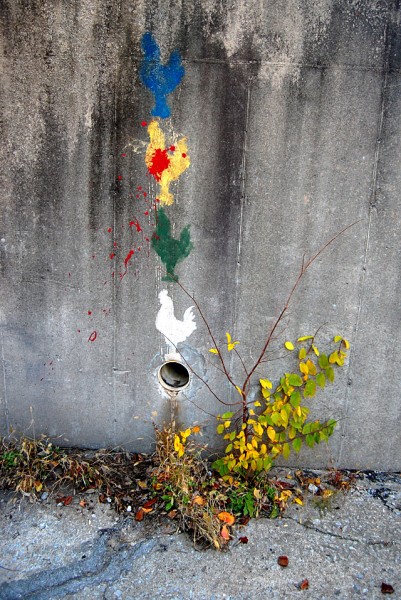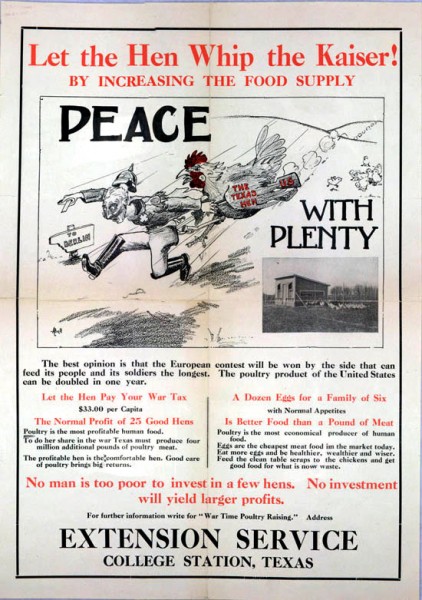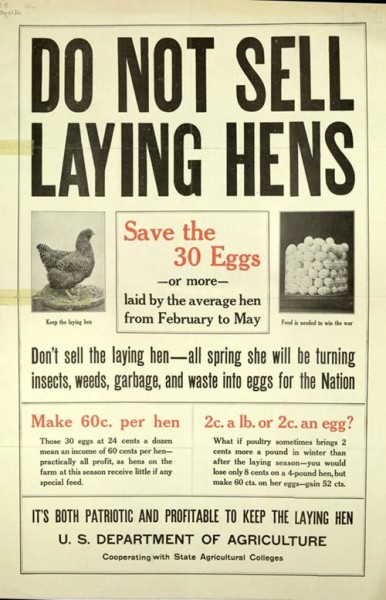 Florida Foodie buddy Jan Norris sent me a link this morning about how chickens became a war crop during World War I. I thought it was interesting, but not that exciting.
Florida Foodie buddy Jan Norris sent me a link this morning about how chickens became a war crop during World War I. I thought it was interesting, but not that exciting.
Now I see chickens everywhere
 I was shooting a building in th 100 block of North Main Street for a story when I stepped into the alley for a different angle. In my newly chicken-sensitized state, I immediately was drawn to these stencils.
I was shooting a building in th 100 block of North Main Street for a story when I stepped into the alley for a different angle. In my newly chicken-sensitized state, I immediately was drawn to these stencils.
If I was back in the Fine Arts program at Ohio University, we could spend hours analyzing the hidden meanings behind this work of folk art. Is there a significance to the order of the colors? Does the red signify blood? Is it a political statement about the Trickle-Down Theory? Let’s dissect the racial angle. Is it significant that there are no black chickens? Is the white chick on the bottom for a reason? Why are they perched on a drain?
I have to admit that it is curious that the “artist” went to the trouble of using four colors, plus red. Was he / she trying to figure out which color was most suitable for concrete?
Cape has been made safe from chickens
With all of the other obsessions with regulations, I just KNEW Cape would have had to legislate chickens in some form or another. Indeed, an Oct. 10, 2010, Scott Moyers‘ story in The Missourian said that an ordinance that would allow Cape Girardeans to keep up to 10 hens (no roosters) per tract for non-commercial uses was headed for adoption.
Unfortunately for folks hoping to be able to get their fresh eggs from their backyards, the city council switched gears during its Nov. 15, 2010, meeting and put the kibosh on chickens in the city.
Let the Hen Whip the Kaiser!
 While trying to find examples of chicken posters, I came across this great site with lots of war era food posters. It’s worth a visit. This poster was from the College Station, Texas, Extension service in 1917.
While trying to find examples of chicken posters, I came across this great site with lots of war era food posters. It’s worth a visit. This poster was from the College Station, Texas, Extension service in 1917.
Keeping chickens: patriotic and profitable
 This USDA poster urges farmers not so sell laying hens. You could make more money selling the eggs than the chicken, it pointed out.
This USDA poster urges farmers not so sell laying hens. You could make more money selling the eggs than the chicken, it pointed out.
When you look at the posters from those eras, it’s clear that the American public was expected to sacrifice to win the wars.
Where’s THIS message?
Here’s a piece I did when gas prices were headed to four bucks a gallon this spring. It talked about the June 11, 1943, Missourian Phillips 66 ad headlined “You are a Soldier in The Battle of Transportation.”
Have you seen this World War II message delivered on TV, radio or print or by any politicians?
“Every bit of rubber and gasoline you save on the home front is a contribution to the combat needs of our fighting men on every battle front.
“You can help hasten the day of victory by confining your driving to a patriotic minimum. Use your car only for going to and from work …for needed shopping…for war-time activities like vegetable gardening…for travel to and from places without other transportation facilities.
“Remember, your Government asks you to do your part to prevent a transportation breakdown, asks you to care for your car–for your country.”
The concept of shared sacrifice for the common good just isn’t popular these days, I guess.

Dear Ken,
My father, Harry Stein, (born and raised on Themis Street) was an employee of Ralston Purina from 1931- 1969. From about 1945 to 1950 he raised chickens in our garage in Webster Groves. I believed it was an outgrowth of his employer’s interests in chicken research, but now I think he must have done it as a patriotic contribution to WW II. I was the child who was designated to retrieve the eggs each morning, and it wasn’t my favorite task! Anyway, I thoroughly enjoyed the posters and your comments……and I feel much better about the nightmares I still have concerning those pecking hens!
Now you’ve done it, Ken! You’ve gone off the deep end! A chicken blog? I love it!!! Great way to start the day!
When our families built our three homes on the Cape Rock Dr property (across from Ranchito Dr) shortly after World War II, included was the chicken house behind 1100 N. Cape Rock. It was in use until the middle 1950s. We gathered eggs every day and an occasional hen for the traditional family Sunday Dinner after Church. The chicken house was no longer used after 1958 or so. With the property being sold and the families scattering, the chicken house disappeared some time, I would guess in the late 1960s. I imagine there is still the chicken house concrete sidewalk going to the back of the property to nowhere now.
Dorie Meyer our next door neighbor, also had a chicken coop and bigger chicken house. In those days we were still in the “country”.
In Madison, WI, it is legal to have a limited number of hens in the city limits. One of my friends is thinking of doing it for the fresh eggs, but it is a logistical challenge due to the cold winters. If I had a young child, I would consider doing it for the experience.
Ken, we lived with my grandmother on Cedar Lane(a dead end over in the Rodney Vista area, near Arena Park) in the mid-50’s and we had chickens in the back yard. We actually lived in a garage. Mom, Grandma, me, and my younger brother Mark. We had no indoor bathroom and had to take our baths in a tub in the back yard. Lots of interesting stories about those days on Cedar Lane. BTW, last time I was in Cape, the garage was still standing!
You can have chickens in your backyard in Columbia, MO!
It is a shame Cape isn’t going to allow folks to keep hens in town. As a child we had about 15 hens out on Country Club Drive. I live in Anchorage, Alaska now and we are allowed 5 hens for each home. We’ve had our hens for almost a year now and no, the cold weather is not a problem as long as you’ve got a well insulated hen house and a turn a heat lamp on a few hours each day. We get an egg a day from our girls. As there is no way our family can eat 30-35 eggs a day we are selling the excess which pays for the chicken feed and electricity.
We had Chicken when I lived in Naperville outside of Chicago for years. We always had a rooster so mornings were early at the ranch and the neighbors loved the whole crew of them. In colder weather we used a lamp in the hen house and a electrical “thingie” to prevent the water from freezing. They always stayed in the yard and at sundown they marched into the chicken coop like a troop of soldiers. NO bugs in the yard and no smell either. The City I live in now is considering chickens now, but I think our yard is too small now, sniff…the eggs were great and Rooster was always good conversation.
Well Ken, you sure set me to cackling, reading this post (pun intended); it was just eggzactly what I needed this morning.
On a serious note, there are potential health issues with concentrrating quantities of chickens in the city. Their waste must be dealt with on a regular basis to prevent problems.
Ken, we had chickens when we lived on E. Cape Rock Dr. until the old rooster starting chasing me everytime I went into the backyard. He ended up in the stewing pot…I still hate the little buggers.
In the early 1960’s, my Mom brought home a baby chick from the Pharmacy (?) around Easter. We lived on Middle Street. We named it Samantha, but later found it was a rooster. I tried to crow one morning and our neighbor thought it was a woman screaming. Sam started to peck my brother on the head quite regularly so he ended up in a neighbor’s dinner pot.
Poor Cape Girardeau – I live in Colorado and the “chicken” laws are being passed in every small town around Denver – even in Denver itself. You can have hens – but no roosters – even Boulder, Colorado allows it citizens to keep chickens and there is a wonderful special event each year called the “Tour de Coop” where citizens visit chickens coops around town to see what they all look like. I personally have eight hens – they give me 6 – 8 large brown eggs daily – which I give to my children and grandchildren and friends around town. I love it.
Laura Folsom – born in Cape Girardeau
Great look back. I lived between Cape and Jackson and we had two chicken houses for raising broilers. We raised 10,000 chickens in 90 day cycles. I never want to see a chicken house again! My Dad had a business arrangement with Purina, they provided feed and we sold the chickens to them. My take away from my “Chicken Days” is that Chickens are God’s Stupidest animals on this planet…but I was the one cleaning out the chicken crap to get ready for the next batch!
The Irony is that I just finished a website for a client that is all about “Chickens in Key West”
I’m not sure if anyone is still reading this but I am currently petitioning the City of Cape Girardeau to allow chickens by copying the Columbia, MO ordinance… you can see the petition here:
https://www.change.org/p/bard-computer21-biz-allow-chickens-in-city-of-cape-girardeau-with-certain-restrictions-437fb2ab-5aea-4887-98a3-d6e28ac28f94?recruiter=625975481&utm_source=share_petition&utm_medium=copylink